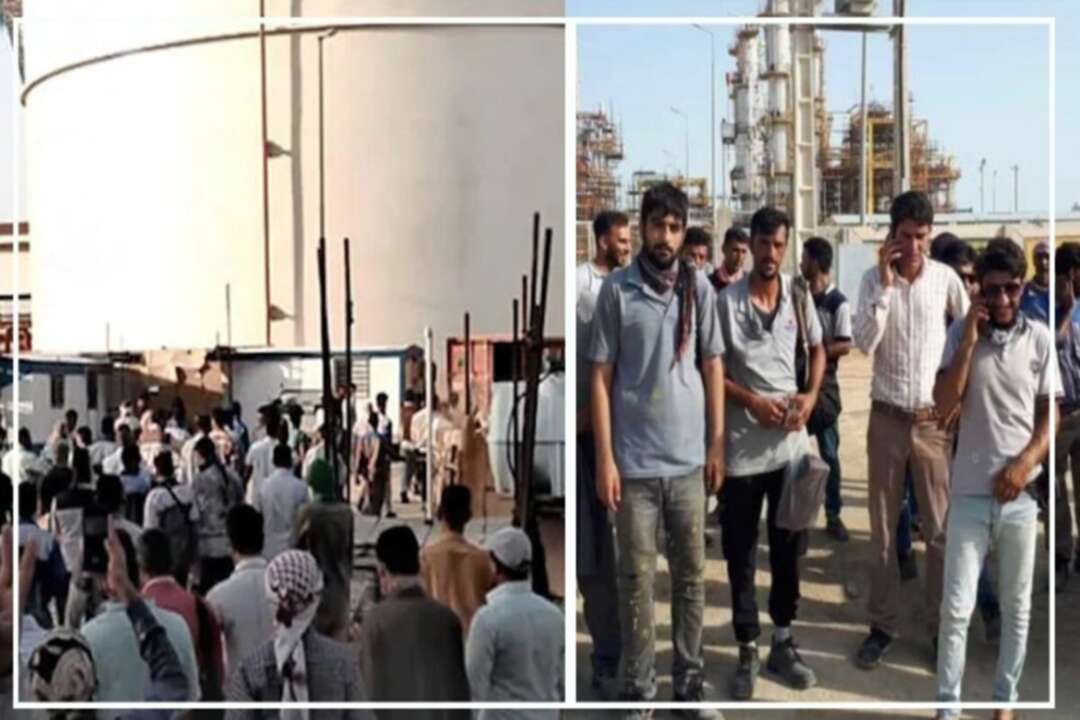-
Widespread strike by Iranian workers!

On June 19, the day Khamenei pulled out Raessi as the next president of Iran from ballot box despite the boycott of the election by a majority of the people, the workers of Farab petroleum company based in Beadkhoon in Assaluyeh in reaction to this appointment went on strike.
The strike, of course, happened after several rallies and protests in recent months. The legitimate demands of the workers are to set the minimum wage above the poverty line, better working conditions, payment of wages and benefits without delay, which sometimes paid several months late. When the workers saw that their demands were not being heeded, they did not wait for Ibrahim Raessi to take over the presidency, so that their situation might improve, because they know, there is no difference between him and Hassan Rouhani in addressing the demands of the workers.
Almost all of Iran's workers now live below the poverty line, and their patience with the empty promises of the regime's leaders to improve their situation is running out. With inflation above 50%, their meager wages, which are almost a third of the poverty line limit, leave them with nothing to lose.
Now, after the protests and strikes of truck drivers, teachers, nurses, and retirees, it is the turn of the oil company workers to react to this situation. The strike, however, came after dozens of employees and workers of the Iranian Oil Company in at least five cities and towns in Assaluyeh, Lavan, and Bahregan and an oil rig in the Persian Gulf protested against their working conditions and low income in late May.
https://twitter.com/IranNW/status/1407639804586643457?s=20
In the following days, the strike expanded, and many cities joined the strike. In Kerman - Butia Steel Workers / In Urmia - Combined Cycle Power Plant Workers / In Qeshm - Workers of Sazeh Farafan Company and Behsh Electricity and Behen Precision Tools of Qeshm Refinery/ In Mahshahr - Fajr Petrochemical Workers / In Assaluyeh - Project Workers of The Polymer Company /In Mahshahr - Workers of Bid Boland refinery projects / in Bandar Abbas - Damavand Star Oil Holding / in Jask - Damavand Star Oil Holding / in Ilam - Jahan Pars and ECO workers, active in Sarvak oil project, located in Azar oil field / in Behbahan – Bead Boland refinery/ In Abadan - Refinery staff / In Isfahan - Workers of Absan Refinery Company / Permanent workers of phases 9 and 10 of South Pars / Workers of refineries and petrochemical centers of Bushehr / Arak Machine Sazi / Workers of Exir Sanat and Satrap Sanat and Sina Refining and construction of Qeshm oil reservoirs and contract workers of phase 13 Kangan and South Adish the refinery, spherical and cylindrical tanks, and Rajan company as well as AJC workers working in Abadan refinery and company workers Lidoma joined the strikers.
Since the oil industry is the most important and influential industry in Iran and any disruption in the production and distribution of petroleum products have crippling effects on all industries and service sectors and society, the strike of oil company workers is totally different from the strike of other guilds. This strike can very well act as a spark in the barrel of gunpowder and make the anger of Iranian society erupt in the current situation and kick start another decisive uprising like the one in November 2019 in a very short time.
https://twitter.com/IranNW/status/1408688966027579399?s=20
Of course, Khamenei and other leaders of the Iranian regime are well aware of this and live in constant fear, but because they cannot resolve any of society’s problems and cannot meet the demands of the workers, they resort to dictatorial methods, which is first they turn to threatening and then arresting and firing the workers. They laid off 700 workers of the Tehran refinery in an act to force other workers to return to work and break their strike.
But despite all the threats by the Iranian regime, the general strike of oil and petrochemical workers have expanded and entered its second week and so far, this strike has affected more than 60 refineries, petrochemical centers, and power plants in Tehran, Arak, Isfahan, Ahvaz, Abadan, Mahshahr, Jask, Assaluyeh, Gachsaran, Damavand, Behbahan, Bushehr., Kangan, Qeshm, Khark, Urmia, Kerman, Bandar Abbas, and Ilam.
Khamenei knows that if he complies with the demands of these workers, he must respond to the demands of other sections of society who want a better living conditions, but because the Iranian regime is drowning in corruption and all its leaders only care for their own interests and their regime’s survival, they have not met people’s legitimate demands. In some cases, in the past, the regime was forced to meet the people’s demand only when they felt the danger of a public uprising.
This time again, the regime was faced with determined workers who have nothing to lose and given that these are the last days of Hassan Rouhani's term, decision-making to resolve these issues have become more difficult.
It is possible that if the regime fails to meet the workers’ demands and these strikes spread further, the whole regime will be in serious danger of collapse and overthrow.
by: Cyrus Yaqubi
Cyrus Yaqubi is a Research Analyst and Iranian Foreign Affairs Commentator investigating the social issues and economy of the middle east countries in general and Iran in particular.
You May Also Like
Popular Posts
Caricature
BENEFIT Sponsors BuildHer...
- April 23, 2025
BENEFIT, the Kingdom’s innovator and leading company in Fintech and electronic financial transactions service, has sponsored the BuildHer CityHack 2025 Hackathon, a two-day event spearheaded by the College of Engineering and Technology at the Royal University for Women (RUW).
Aimed at secondary school students, the event brought together a distinguished group of academic professionals and technology experts to mentor and inspire young participants.
More than 100 high school students from across the Kingdom of Bahrain took part in the hackathon, which featured an intensive programme of training workshops and hands-on sessions. These activities were tailored to enhance participants’ critical thinking, collaborative problem-solving, and team-building capabilities, while also encouraging the development of practical and sustainable solutions to contemporary challenges using modern technological tools.
BENEFIT’s Chief Executive Mr. Abdulwahed AlJanahi, commented: “Our support for this educational hackathon reflects our long-term strategic vision to nurture the talents of emerging national youth and empower the next generation of accomplished female leaders in technology. By fostering creativity and innovation, we aim to contribute meaningfully to Bahrain’s comprehensive development goals and align with the aspirations outlined in the Kingdom’s Vision 2030—an ambition in which BENEFIT plays a central role.”
Professor Riyadh Yousif Hamzah, President of the Royal University for Women, commented: “This initiative reflects our commitment to advancing women in STEM fields. We're cultivating a generation of creative, solution-driven female leaders who will drive national development. Our partnership with BENEFIT exemplifies the powerful synergy between academia and private sector in supporting educational innovation.”
Hanan Abdulla Hasan, Senior Manager, PR & Communication at BENEFIT, said: “We are honoured to collaborate with RUW in supporting this remarkable technology-focused event. It highlights our commitment to social responsibility, and our ongoing efforts to enhance the digital and innovation capabilities of young Bahraini women and foster their ability to harness technological tools in the service of a smarter, more sustainable future.”
For his part, Dr. Humam ElAgha, Acting Dean of the College of Engineering and Technology at the University, said: “BuildHer CityHack 2025 embodies our hands-on approach to education. By tackling real-world problems through creative thinking and sustainable solutions, we're preparing women to thrive in the knowledge economy – a cornerstone of the University's vision.”
opinion
Report
ads
Newsletter
Subscribe to our mailing list to get the new updates!






















